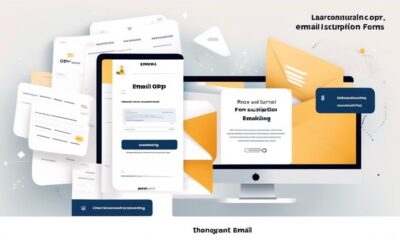Email Marketing
Is Email Marketing Legal
Understand the legal complexities of email marketing and discover how businesses can ensure compliance while effectively reaching their audience.

“The phrase “the money is in the list” is well-known to most people, and it is indeed accurate – email marketing generates an impressive return on investment (ROI) of 4200%.”
But before you hit send on your next campaign, it's crucial to understand the legalities surrounding email marketing. With the increasing focus on data privacy and protection, navigating the laws and regulations governing email marketing can be complex.
So, what exactly makes email marketing legal? Let's unpack the intricacies and explore how businesses can ensure compliance while still effectively reaching their audience.
Key Takeaways
- Email marketing laws, such as CAN-SPAM Act, GDPR, CCPA, and HIPAA, exist to protect user privacy and prevent spam and unsolicited messages.
- Obtaining explicit consent from subscribers and providing easy opt-out mechanisms are crucial for compliance with email marketing laws.
- Adhering to email marketing laws ensures ethical practices and helps maintain a company's reputation.
- Violating email marketing laws can lead to severe financial penalties and reputational damage, with fines reaching up to millions of dollars.
Email Marketing Laws Overview
We must ensure compliance with email marketing laws such as CAN-SPAM Act, GDPR, CCPA, and HIPAA to maintain legal and ethical practices. These laws dictate the rules for email marketing, ensuring that users' privacy is protected and preventing the spread of spam and unsolicited messages. Under these laws, businesses engaging in email marketing must obtain consent from users before sending marketing emails. Additionally, they must provide a clear and easy way for users to unsubscribe from receiving further emails.
The GDPR, or General Data Protection Regulation, is a crucial law that sets guidelines for the collection and processing of personal information of individuals within the European Union. It requires businesses to obtain explicit consent from individuals before sending them marketing emails and provides individuals with the right to access and control their personal data.
Failure to comply with these laws can result in hefty fines and damage to a company's reputation. Therefore, it's essential for businesses to stay informed about these regulations and ensure that their email marketing practices align with the legal requirements to protect both the company and its customers.
Regulating Email Marketing

Let's talk about the legal requirements for emails, including the importance of obtaining opt-in consent from recipients and providing a clear opt-out mechanism for unsubscribing.
We'll also cover the anti-spam laws that prohibit sending unsolicited marketing messages and the implications of non-compliance.
These points are crucial for understanding the regulatory framework that governs email marketing practices.
Legal Requirements for Emails
Complying with legal requirements for email marketing is crucial for businesses to avoid fines and maintain a positive reputation while respecting user privacy and consent.
Legal requirements for emails mandate obtaining explicit consent from subscribers before sending marketing communications. Email marketing platforms must ensure that subscribers have willingly opted in to receive emails, and they must provide easy opt-out options.
It's essential to maintain clean mailing lists and store valid proof of consent to demonstrate compliance with the law. Transparency and honesty in email content and subject lines are also key legal requirements.
Failure to adhere to these regulations can result in significant financial penalties and harm to a company's brand reputation. Therefore, businesses must prioritize understanding and meeting the legal requirements for email marketing to operate ethically and lawfully.
Opt-In and Opt-Out
Transitioning from the legal requirements for emails, the regulation of email marketing revolves around the crucial aspects of opt-in and opt-out procedures.
When it comes to email marketing, obtaining explicit consent through opt-in mechanisms is crucial for compliance with laws such as the CAN-SPAM Act. Storing valid proof of consent is essential, and businesses must refrain from assuming consent from recipient inactivity.
Additionally, international email laws require providing a simple opt-out process, typically through an easily accessible unsubscribe button. Respect for recipients' wishes to unsubscribe is paramount, and failure to honor opt-out requests can result in legal consequences.
It's also important to note that purchasing email lists necessitates specific consent from individuals on the list, and using bought lists without proper consent can lead to legal trouble.
Providing transparent sender identity information, including name, company name, and physical address, is also a fundamental requirement in email marketing.
Anti-Spam Laws
To ensure email marketing compliance and prevent unsolicited messages, anti-spam laws play a crucial role in regulating the sending of marketing emails. These laws, such as the CAN-SPAM Act in the US and the GDPR in the EU, require marketers to obtain consent before sending promotional emails. Non-compliance can lead to hefty fines and reputational damage. Below is a table outlining key international email laws:
| Legislation | Region |
|---|---|
| CAN-SPAM Act | United States |
| GDPR | European Union |
| CCPA | California, US |
| HIPAA | United States |
Adhering to these laws is not only a legal requirement but also essential for ethical marketing practices and maintaining user trust. Understanding and complying with anti-spam laws is fundamental for any organization engaged in email marketing.
Key Email Marketing Laws

Email marketing laws, such as the CAN-SPAM Act, GDPR, CCPA, and HIPAA, establish crucial guidelines for businesses to adhere to when engaging in email marketing practices. Understanding these key email marketing laws is essential for legal and ethical email marketing.
Here are the key points to consider:
- Consent: Laws like GDPR and CAN-SPAM Act require businesses to obtain explicit consent from individuals before sending them marketing emails. Consent must be freely given, specific, informed, and unambiguous.
- Data Protection: Email marketing laws emphasize the protection of personal data. Businesses must ensure that they handle and store subscribers' data securely and in compliance with the relevant data protection regulations.
- Compliance and Enforcement: Non-compliance with email marketing laws can lead to severe consequences, including fines and damage to a business's reputation. Regulatory bodies, such as the FTC and the European Data Protection Board, enforce and regulate these laws.
Understanding and adhering to these key email marketing laws not only ensures legal compliance but also fosters trust and positive relationships with subscribers.
Email Marketing Laws by Country

Understanding and adhering to key email marketing laws, such as the CAN-SPAM Act and GDPR, is essential for businesses as they navigate the diverse regulatory landscape of email marketing laws by country. Different international email laws, such as the General Data Protection Regulation (GDPR) in the European Union and the CAN-SPAM Act in the United States, impose specific requirements on businesses engaging in email marketing. To provide a clearer understanding of the varying regulations, we have compiled a table outlining some key aspects of email marketing laws in different countries.
| Country | Regulatory Body | Key Requirements |
|---|---|---|
| United States | Federal Trade Commission (FTC) | – Consent for sending marketing emails |
| – Provision of a valid postal address | ||
| European Union | European Data Protection Board (EDPB) | – Explicit consent for data processing and marketing emails |
| – Right to opt-out of marketing communications | ||
| Canada | Canadian Radio-television and | – Consent for sending commercial electronic messages |
| Telecommunications Commission (CRTC) | – Identification of the sender in marketing emails |
These are just a few examples of the email marketing laws in different countries, each with its specific requirements and regulatory bodies ensuring compliance.
Penalties for Violating Email Marketing Laws

Violating email marketing laws can result in severe financial penalties and reputational damage, making it crucial for businesses to understand and adhere to the regulations.
The penalties for violating email marketing laws can be substantial. According to the CAN-SPAM Act, violations can lead to penalties of up to $50,000 per violation. Furthermore, GDPR violations can result in fines reaching up to €20 million or 4% of global annual turnover. In the case of CCPA violations, businesses may face fines of $2,500 per violation or $7,500 per intentional violation. Additionally, HIPAA fines can range from $100 to $50,000 per violation, depending on the type of violation.
It's important to note that violating email marketing laws may not only result in financial penalties but also lead to significant damage to brand reputation and customer trust. Therefore, understanding and complying with the legal aspects of email marketing is essential for businesses to avoid these severe consequences.
Ensuring Compliance With Email Marketing Laws

Before sending out marketing emails, we need to ensure that we meet the legal requirements. This includes obtaining consent from recipients and providing clear unsubscribe options.
Legal Requirements for Emails
To ensure compliance with email marketing laws, businesses must obtain explicit consent from users before sending marketing emails and adhere to specific requirements outlined in laws such as the CAN-SPAM Act, GDPR, CCPA, and HIPAA.
When sending marketing emails, legal requirements include:
- Including a clear and conspicuous unsubscribe link in every email.
- Not using false or misleading header information or deceptive subject lines.
- Safeguarding personal information and ensuring its confidentiality.
These legal requirements aim to protect user privacy and prevent spam and unsolicited email messages. Non-compliance can lead to fines, damage to reputation, and legal consequences.
Therefore, businesses should maintain a clean mailing list, provide easy opt-out options, obtain and record consent, and adhere to regulations to avoid legal issues in different countries.
Compliance with email marketing laws demonstrates a commitment to respecting users' rights and privacy.
Consent for Email Marketing
Ensuring compliance with email marketing laws involves obtaining explicit consent from users to send marketing emails, a fundamental requirement for businesses aiming to protect user privacy and prevent spam. Obtaining consent requires businesses to clearly communicate the purpose of collecting the email address and provide an option for users to opt-in or opt-out. This table illustrates the impact of obtaining consent on email marketing:
| Obtaining Consent | Impact |
|---|---|
| Explicit consent demonstrates respect for user privacy | Builds trust and loyalty |
| Users are less likely to mark emails as spam | Higher deliverability and open rates |
| Compliance with legal requirements | Avoids fines and legal consequences |
Obtaining consent not only ensures legal compliance but also fosters positive relationships with users, leading to a more effective and ethical email marketing strategy.
Unsubscribe Options
In our email marketing efforts, we prioritize providing a visible and user-friendly unsubscribe option in our marketing emails to ensure compliance with email marketing laws.
When addressing unsubscribe options, we focus on:
- Ensuring the opt-out link is prominently displayed and easily accessible within the email, in line with legal requirements.
- Offering a straightforward and user-friendly unsubscription process that respects recipients' wishes and rights, as mandated by the CAN-SPAM Act.
- Honoring opt-out requests promptly and within the required timeframe to adhere to legal regulations, thus demonstrating our commitment to compliance with email marketing laws.
Steps to Ensure Legal Email Marketing

When engaging in email marketing, it is crucial to take specific steps to ensure that our practices comply with legal regulations and protect both recipients and our own reputation. To ensure legal email marketing, we must obtain consent from recipients, providing a clear and documented record of their explicit opt-in to receive marketing emails. Additionally, it is essential to provide an easy opt-out process, honoring unsubscribe requests promptly. Purchasing email lists should be avoided, as legal issues and wasted resources can result. Adhering to international laws, such as the CAN-SPAM Act, CASL Act, GDPR, and Spam Act of 2003, when targeting recipients in different countries is vital. Maintaining transparency by clearly identifying ourselves in emails, providing contact details, and ensuring that subject lines accurately reflect the message's content is paramount. Below is a table summarizing the steps to ensure legal email marketing:
| Steps to Ensure Legal Email Marketing | |
|---|---|
| Obtain Consent | Provide Easy Opt-Out |
| Avoid Purchased Email Lists | Comply with International Laws |
| Maintain Transparency |
Adhering to these steps is crucial to ensure that our email marketing practices are legal and ethical.
CAN-SPAM Act Compliance Guide

Compliance with the CAN-SPAM Act is crucial for maintaining legal and ethical email marketing practices. To ensure CAN-SPAM Act compliance, it's essential to:
- Provide accurate header information in all marketing emails, including the 'From,' 'To,' and 'Reply-To' fields, as well as a valid physical postal address.
- Offer clear and conspicuous opt-out mechanisms in all marketing emails, allowing recipients to easily unsubscribe from future communications.
- Monitor third-party email marketing services to ensure they adhere to CAN-SPAM Act requirements, as legal responsibility ultimately lies with the sender.
Obtaining consent before sending marketing emails and being transparent with subscribers about what they're opting into are also essential for compliance.
Remember, the CAN-SPAM Act imposes significant penalties for non-compliance, making it imperative to adhere to its regulations.
Determining CAN-SPAM Act Coverage

After ensuring compliance with the CAN-SPAM Act in our email marketing practices, it's essential to understand the coverage of the law to determine its applicability to various types of commercial messages.
The CAN-SPAM Act applies to all commercial messages, not just bulk emails, promoting products or services. This means that business-to-business emails aren't exempt from the CAN-SPAM Act's coverage.
To comply with the law, it's necessary to ensure that the emails contain accurate header information, non-deceptive subject lines, a clear disclosure that the message is an advertisement, and inclusion of a valid physical postal address. Additionally, the emails must provide recipients with a conspicuous explanation of how to opt out of future emails.
It's important to note that subscribers and members have the right to opt out of marketing emails, and consent isn't required for sending marketing emails to them. When determining the primary purpose of an email, it's crucial to understand if it falls under the CAN-SPAM Act's coverage. This understanding is essential for legal and ethical email marketing practices.
Understanding Transactional Vs. Relationship Messages

Understanding the distinction between transactional and relationship messages is crucial for effective email marketing strategies. When it comes to email marketing, it's essential to differentiate between these types of messages to ensure compliance with legal requirements and to maintain positive relationships with recipients.
Here's a breakdown of the key points to consider:
- Transactional Messages:
- These are communications that facilitate, complete, or confirm a commercial transaction that the recipient has previously agreed to.
- They're typically related to a specific transaction or interaction with the recipient, such as purchase receipts, shipping notifications, or account updates.
- Transactional messages are exempt from the consent and unsubscribe requirements of the CAN-SPAM Act, as they're considered necessary for the ongoing business relationship.
- Relationship Messages:
- These messages are designed to build and maintain a relationship with the recipient.
- They may include newsletters, product updates, or promotional offers aimed at nurturing customer loyalty.
- Unlike transactional messages, relationship messages must comply with the CAN-SPAM Act's consent and opt-out provisions, requiring explicit permission from recipients to receive such communications.
Understanding and correctly categorizing messages as transactional or relationship is vital for businesses and consumers alike to ensure legal compliance and maintain positive engagement in email marketing efforts.
Penalties for Violating CAN-SPAM Act

Penalties for violating the CAN-SPAM Act can result in significant financial consequences and damage to brand reputation, making compliance crucial for businesses engaging in email marketing. Non-compliance with the CAN-SPAM Act can lead to fines of up to $50,000 per violation. To provide a clearer picture, here's a table detailing the penalties for violating various email marketing laws:
| Legislation | Maximum Fine per Violation |
|---|---|
| CAN-SPAM Act | Up to $50,000 |
| GDPR | Up to €20 million or 4% of global annual turnover |
| CCPA | $2,500 per violation, $7,500 per intentional violation |
| HIPAA | Fines ranging from $100 to $50,000 per violation |
As seen in the table, the penalties for violating the CAN-SPAM Act are substantial. In addition to financial penalties, companies that fail to comply with email marketing laws risk tarnishing their brand reputation and losing customer trust. Therefore, it is imperative that companies comply with these regulations to avoid legal repercussions and maintain a positive brand image.
Ensuring Legal Marketing Emails

Let's talk about the essential points for ensuring legal marketing emails.
First, we need to consider the consent requirements – making sure we've permission from recipients to send them marketing emails.
Secondly, we must focus on opt-out procedures, ensuring that recipients can easily unsubscribe if they choose to do so.
Consent Requirements
To ensure legal compliance when sending marketing emails, obtaining consent from recipients is a crucial and mandatory requirement. When obtaining consent for email marketing, it's essential to consider the following points:
- Explicit Consent: Ensure that recipients have explicitly opted in to receive marketing emails, and clearly outline the type of content they'll receive.
- Transparency: Provide clear and transparent information about the purpose of collecting email addresses and how they'll be used for marketing communication.
- Compliance with Regulations: Adhere to specific legislation such as the CAN-SPAM Act, GDPR, CCPA, and HIPAA, which outline consent requirements for email marketers to follow.
Opt-Out Procedures
When ensuring legal compliance in email marketing, there are several important considerations to keep in mind.
Firstly, implementing effective opt-out procedures is essential for providing recipients with a seamless unsubscription process. To adhere to legal requirements, marketing emails must include a visible and easy-to-use opt-out link. It's crucial to process opt-out requests promptly and within the required timeframe to comply with email marketing laws.
Additionally, maintaining updated suppression lists, recording opt-outs, and removing unsubscribed individuals from marketing emails is necessary. This helps to ensure that you are not inadvertently sending emails to individuals who have expressed their desire to no longer receive them.
To avoid legal issues, it's important to collect leads or subscribers legally. This can be done through methods such as website opt-ins or targeted outreach, rather than purchasing email lists. By doing so, you can ensure that you have obtained consent from individuals to send them marketing emails.
Transparency and legal compliance can also be ensured by providing identifiable sender information. This includes including contact details and a physical mailing address in email templates. These measures help to prevent emails from being flagged as spam and maintain compliance with the CAN-SPAM Act.
Sending Marketing Emails Legally

How can businesses ensure they're sending marketing emails legally while complying with email marketing laws in various countries?
When sending marketing emails, businesses must prioritize compliance with email marketing laws to avoid legal issues and maintain ethical practices. To achieve this, businesses can take the following steps:
- Obtain Consent: Ensure that recipients have explicitly opted in to receive marketing emails, as this demonstrates compliance with laws such as the CAN-SPAM Act and GDPR.
- Permission-Based Lists: Build email lists through permission-based methods, where users willingly provide their email addresses for marketing communication.
- Unsubscribe Mechanism: Include a clear and easy-to-use unsubscribe option in all marketing emails to respect recipients' preferences and comply with opt-out requirements.
Can I Use Email Marketing for Promotional Purposes Without Breaking the Law?
Yes, you can use email marketing for promotional purposes without breaking the law. Understanding the importance of email marketing laws and regulations is crucial for maintaining compliance. Obtaining consent from recipients, providing an option to unsubscribe, and including accurate sender information are key components to ensure legal and effective email marketing campaigns.
Frequently Asked Questions
Can You Get in Trouble for Email Marketing?
Yes, we can get in trouble for email marketing if we don't comply with the laws. Non-compliance can lead to fines, damage to our reputation, and legal consequences.
It's crucial to follow regulations such as CAN-SPAM Act, GDPR, CCPA, and HIPAA. We must obtain consent from users, maintain clean mailing lists, and provide an easy opt-out process.
Compliance with email marketing laws is essential to avoid trouble and protect user privacy.
Do I Need Permission to Send Marketing Emails?
We definitely need permission to send marketing emails. It's crucial to ensure that we've consent from recipients to comply with regulations and avoid legal issues. Non-compliance can result in fines and damage to our company's reputation.
Each country has its regulatory bodies overseeing email marketing laws, such as the Federal Trade Commission in the US and the European Data Protection Board in the EU. Following these laws helps us build trust with our audience and avoid potential legal troubles.
Is Email Marketing Allowed?
Email marketing is allowed when done in compliance with relevant laws and regulations. It's essential to obtain consent, provide easy opt-out options, and maintain a clean mailing list to ensure compliance. By following these best practices, businesses can engage in ethical and effective email marketing.
Compliance with email marketing laws, such as CAN-SPAM Act, GDPR, CCPA, and HIPAA, is crucial to avoid fines and protect brand reputation.
Which Type of Email Marketing Is Considered as Legal?
Which type of email marketing is considered as legal?
Email marketing must comply with regulations like CAN-SPAM Act, GDPR, CCPA, and HIPAA.
Best practices for compliance include obtaining explicit consent, providing easy opt-out options, and maintaining a clean mailing list.
Non-compliance can result in financial penalties, brand reputation damage, and legal consequences.
It's crucial to adhere to these laws to avoid such issues and ensure long-term business success and growth.
Is Email Marketing for Dummies a Legal and Ethical Practice?
Yes, email marketing for beginners is a legal and ethical practice as long as you follow best practices and adhere to regulations. Some email marketing tips for beginners include obtaining permission to send emails, providing clear opt-out options, and ensuring that your emails are relevant and valuable to your audience.
Conclusion
In conclusion, it's crucial for businesses to adhere to email marketing laws to avoid legal issues and maintain ethical practices. By obtaining consent, understanding regulations, and sending marketing emails legally, businesses can protect user privacy and avoid penalties.
It's important to stay informed and compliant with the laws in each country to ensure that email marketing efforts are effective and legal. As the saying goes, 'Better safe than sorry.'
Bryn – AI Expert Writer Bryn is the wizard of words and AI at Influenctor. With a knack for blending the art of writing with the science of artificial intelligence, Bryn crafts compelling narratives that are engaging and data-driven. Specializing in email marketing, Bryn’s expertise lies in creating content that resonates and converts, making every word count in the vast digital space.
Personalized Email Strategies
Email Marketing for Home Inspectors
Stand out in the competitive home inspection industry with powerful email marketing strategies that will take your business to the next level.

Let’s face it – standing out in the competitive home inspection industry is like searching for a needle in a haystack. However, there is a successful tactic that allows us to cut through the noise and make a lasting impression: email marketing.
It’s not just about sending out generic newsletters; it’s about strategically nurturing relationships and staying top-of-mind with realtors who can be valuable sources of referrals.
But how do we effectively craft emails that resonate with our audience and drive results? Well, it all starts with understanding the benefits of email marketing for home inspectors and harnessing its potential to showcase our expertise, build trust, and ultimately grow our business.
Key Takeaways
- Email marketing allows home inspectors to reach a targeted audience and expand their reach through shareable content.
- Craft attention-grabbing subject lines and provide concise, valuable content that addresses recipients’ pain points to effectively engage with subscribers.
- Collaborate with other home inspection companies or real estate agents to grow your email list and offer valuable information to reach new potential subscribers.
- Personalize emails, use effective calls to action, and establish a strong online presence to maximize the impact of your email campaigns.
Benefits of Email Marketing
Email marketing offers a powerful way to reach a targeted audience and expand our reach through shareable content, making it a reliable and effective communication channel for home inspectors. With the ability to select a specific audience, we can ensure that our messages reach the right individuals, such as real estate agents and potential clients within the home inspection industry. Shareable content not only increases our reach but also helps in generating more leads, thereby broadening our audience and increasing brand awareness. The high usage of email ensures the delivery of our messages, making it a dependable tool for our marketing strategy.
Through email marketing campaigns, we can stay top-of-mind with industry professionals and potential clients, enhancing our visibility and credibility within the industry. It also serves as an effective tool for promoting events, announcements, and industry knowledge, providing us with a platform to showcase our expertise in home inspections. As we aim to establish a strong digital presence, email marketing proves to be an essential component of our overall marketing strategy, allowing us to communicate directly with our target audience and foster meaningful connections.
Effective Email Content

When crafting effective email content, we aim to personalize and target our messages to resonate with our specific audience. It’s crucial for home inspectors to tailor their email content to cater to the needs and interests of their real estate clients, agents, and home inspectors.
To achieve this, we focus on the following key strategies:
- Compelling Subject Lines and Valuable Content:
- Crafting attention-grabbing subject lines that entice recipients to open the email.
- Providing concise, valuable content that delivers relevant information and addresses the recipients’ pain points.
- Clear Calls-to-Action and Email Automation:
- Including clear calls-to-action in emails to prompt desired responses and actions from recipients.
- Utilizing email automation tools to streamline and enhance the efficiency of email marketing campaigns.
In the competitive landscape of the home inspection business, effective email content can serve as a powerful tool for engaging with real estate clients, nurturing relationships with agents, and fostering collaboration with fellow home inspectors. By implementing these strategies and continuously monitoring and analyzing email performance metrics, home inspectors can optimize their email content to drive successful home inspection marketing campaigns.
Growing Your Email List
To grow your email list effectively, we consistently seek out opportunities to engage with potential clients and expand our network of contacts in the real estate industry. One way to achieve this is by collaborating with other home inspection companies or real estate agents and home professionals. By offering to contribute a blog post or provide valuable information to their audience, we can reach new potential subscribers who are interested in our services.
Additionally, we use email as a tool to build trust and provide valuable information. When connecting with clients or industry professionals, we ensure that every interaction is an opportunity to showcase our expertise and the benefits of being part of our email list. By consistently delivering good email content, we can keep our subscribers engaged and build a positive reputation in the industry.
Another effective way of growing your email list is by encouraging satisfied clients to join our contact list and share their positive experiences with others. We also utilize social media platforms to promote our email list and engage with potential subscribers. By implementing these strategies, we can steadily expand our email list with high-quality leads and maintain a strong network of contacts in the real estate industry.
Maximizing Email Campaigns

As we aim to maximize the impact of our email marketing efforts, personalized communication and valuable content will continue to be the cornerstones of our strategy.
To ensure higher open rates and engagement, we’ve found that incorporating captivating content and exclusive offers is a great way to make our emails stand out.
Consider the following tips for home inspectors:
- Establish Strong Online Presence
- Engage with subscribers through personalized greetings and tailored recommendations based on their previous interactions with your website or services.
- Utilize segmentation to target specific groups with content relevant to their needs and interests.
- Incorporate Effective Call to Action
- Encourage recipients to take action by including clear and compelling calls to action that prompt them to explore your services or claim exclusive offers.
Avoiding Email Marketing Pitfalls
To successfully navigate the realm of email marketing, a thorough understanding of potential pitfalls is essential for home inspectors seeking to maintain a positive brand image and engage effectively with recipients. By avoiding common email marketing pitfalls, home inspectors can enhance their credibility, build strong relationships, and keep recipients engaged. Here are some key pitfalls to watch out for and how to steer clear of them:
| Pitfall | How to Avoid It |
|---|---|
| Ensure compliance with email marketing laws and regulations | Stay informed about the laws and regulations governing email marketing to avoid legal issues. |
| Avoid sending too many emails | Set a reasonable frequency for your emails to prevent overwhelming or annoying recipients. |
| Use a professional and clean email design | Create a visually appealing and easy-to-navigate email template to maintain a positive brand image. |
| Personalize emails and avoid generic content | Tailor your emails to the recipient’s needs and interests to enhance engagement and relevance. |
| Regularly clean and update email lists | Keep your contact information up to date and remove outdated or incorrect addresses to ensure your emails reach the right audience right away. |
Frequently Asked Questions
How Can Home Inspectors Ensure Their Email Marketing Campaigns Are Compliant With Privacy Laws and Regulations?
We ensure email marketing campaigns comply with privacy laws and regulations by staying informed about current legislation and regulations.
We regularly review and update our email lists to ensure they only include individuals who’ve opted in.
Our email content includes clear opt-out options and complies with requirements for data protection and privacy.
We also maintain records of consent and regularly audit our practices to ensure ongoing compliance with evolving regulations.
What Are Some Creative Ways Home Inspectors Can Segment Their Email Lists to Target Different Types of Clients?
Segmenting email lists for home inspectors can be a game-changer.
We can group clients based on property type, like condos or single-family homes, or by specific needs such as first-time buyers or investors.
This allows us to tailor our messages, providing relevant content to each group, increasing engagement and conversions.
Are There Any Specific Email Marketing Tools or Platforms That Are Recommended for Home Inspectors?
We’ve found that email marketing tools like Mailchimp, Constant Contact, and HubSpot are highly recommended for home inspectors. These platforms offer user-friendly interfaces, customizable templates, and robust analytics to track email performance.
They also provide features for segmenting email lists, automating campaigns, and integrating with other marketing tools.
How Can Home Inspectors Measure the Success of Their Email Marketing Campaigns and Track Their Return on Investment?
We measure the success of our email marketing campaigns by tracking key performance indicators like open rates, click-through rates, conversion rates, and overall engagement.
Additionally, we use specific tools to attribute leads and sales to our email marketing efforts, allowing us to calculate the return on investment.
This data-driven approach gives us valuable insights into the effectiveness of our email campaigns and helps us make informed decisions for future strategies.
What Are Some Strategies for Re-Engaging With Inactive or Unresponsive Subscribers in an Email List?
When subscribers become inactive or unresponsive, we re-engage by sending targeted content that aligns with their interests. We segment the list to better understand their preferences and then personalize our emails.
We also use compelling subject lines and call-to-action buttons to draw them back in. By offering exclusive deals or valuable content, we aim to reignite their interest and encourage them to re-engage with our emails.
Conclusion
In conclusion, email marketing is a powerful tool for home inspectors to connect with realtors and grow their business.
Just like a well-maintained house, a carefully crafted email campaign can attract attention, build trust, and create lasting relationships.
By providing valuable content, personalized messages, and incentives, home inspectors can stay top-of-mind with realtors and generate more referrals and business opportunities.
So, let’s start building our email marketing strategy and watch our business grow!
Natali – Editor in Chief (Strategy and Mastery, AI Expert) Natali, our Editor in Chief, is the driving force behind our content’s strategic direction. With a keen eye for detail and a deep understanding of market trends, Natali ensures that our content is top-notch and strategically aligned with our client’s goals. Her expertise in AI helps to seamlessly integrate advanced technology into our marketing strategies, pushing the boundaries of conventional marketing.
Personalized Email Strategies
Email Marketing for Logistics
Nurture your logistics business with the game-changing potential of email marketing and unlock new opportunities for growth.

Women and men, let’s talk about the undeniable powerhouse when it comes to modern logistical marketing strategies – email marketing.
We all know that the logistics industry is fast-paced and constantly evolving, and email marketing has proven to be a game-changer in this ever-shifting landscape.
But how exactly can email marketing revolutionize the way logistics companies connect with their audience and drive business growth?
Well, buckle up, because we’re about to uncover some powerful insights that might just reshape the way you think about reaching your customers and prospects.
Key Takeaways
- Welcome emails and monthly newsletters are effective ways to establish a positive first impression and keep customers informed about industry trends and company updates in the logistics field.
- Promotional emails with catchy subject lines can attract customer attention and encourage exploration of the company’s offerings in the logistics industry.
- Automated email series can save time in nurturing new contacts and ensure consistent communication with potential customers in the logistics sector.
- Personalization, clear call-to-action buttons, concise and engaging content, and visually appealing elements are key factors in crafting engaging email content for logistics email marketing campaigns.
Types of Effective Emails for Logistics
When it comes to engaging with clients and maintaining effective communication in the logistics industry, utilizing various types of emails can significantly enhance customer relations and business operations.
Email marketing plays a crucial role in the logistics sector by helping companies stay connected with their customers. One type of email that can be extremely beneficial is the welcome email. These emails help set expectations and greet new subscribers, establishing a positive first impression. In the logistics industry, a well-crafted welcome email can reassure customers about the efficiency and reliability of the company’s services.
Another effective type of email for logistics companies is the monthly newsletter. These newsletters can highlight updates, address frequently asked questions, and provide valuable information to keep subscribers engaged. By sending out monthly newsletters, logistics companies can keep their customers informed about industry trends, new services, and any changes in operations.
Additionally, promotional emails are essential for sharing important news, offers, or updates that deserve dedicated attention. A well-designed promotional email with a catchy subject line can attract the customer’s attention and encourage them to explore the company’s latest offerings.
Automated email series are also valuable in the logistics industry, as they can save time in nurturing new contacts and ensure consistent communication.
Lastly, invitations to connect through follow-up emails including links to social media and the company’s website can increase interaction and brand familiarity.
All these types of emails help logistics companies maintain effective communication and enhance customer relations.
Tips for Successful Email Marketing

To achieve successful email marketing in the logistics industry, personalizing emails with targeted messaging to specific customer segments is essential. By segmenting your audience, you can tailor your content to their specific needs and interests, increasing the relevance and impact of your emails. This can lead to higher engagement and conversion rates.
When it comes to email marketing strategies for logistics companies, utilizing email automation is crucial. Automation tools can help streamline the process, saving time and resources while optimizing results. This allows you to send bulk emails while still maintaining a personalized touch, ultimately helping you generate leads and nurture customer relationships more effectively.
Crafting compelling and relevant content is another key aspect of a successful email marketing strategy for logistics companies. By providing valuable information and offers, you can increase customer engagement and loyalty, ultimately driving the success of your marketing campaigns.
Incorporating these tips into your email campaigns can help logistics companies significantly improve their email marketing strategy, leading to more effective communication with customers and better business outcomes.
Implementing Email Automation Tools
We utilize email automation tools to streamline our communication processes and efficiently deliver targeted messages to the right audience at the right time.
Implementing email automation tools allows our logistics company to save time and effort by setting up automated email series to engage with potential customers consistently.
These tools enable us to send personalized versions of the same message, tailoring content to meet the needs and preferences of individual recipients.
By utilizing triggers and actions, we can send targeted emails based on user behavior, increasing efficiency and identifying quality leads for our email marketing campaign.
Reliable email marketing platforms offer automation capabilities for various types of emails, such as welcome emails and confirmation emails, ensuring consistent and timely communication with subscribers.
Additionally, these tools provide insights into the performance of our emails, helping us refine our strategies for supply chain and digital marketing.
Through email automation, we can experiment with different subject lines and content to optimize our emails and enhance our digital marketing efforts.
Crafting Engaging Email Content

Our approach to crafting engaging email content involves creating attention-grabbing subject lines to increase open rates and engagement. When crafting your email content, it’s important to personalize the message to cater to the recipient’s interests and preferences. This not only increases the likelihood of the recipient opening your email but also enhances engagement.
Additionally, incorporating clear and compelling call-to-action buttons can guide email users towards the desired actions, further optimizing your email campaign for increased engagement. Furthermore, keeping the email content concise, engaging, and easily scannable ensures quick comprehension, making it more likely for the recipient to engage with the content.
Lastly, integrating visually appealing and interactive elements into your emails can significantly enhance engagement and interaction, contributing to the success of your email marketing strategies for supply chain and logistics. By following these strategies, you can create compelling and engaging email content that resonates with your audience and fosters reliable logistics marketing.
Developing a Targeted Email Strategy
Understanding your target audience’s needs and preferences is crucial for developing a successful targeted email strategy. By segmenting your email list and sending personalized content, you can provide information that resonates with specific customer groups. Automation plays a vital role in streamlining email marketing efforts, ensuring that the right person receives the right message at the right time. Crafting engaging subject lines is essential for increasing open rates and driving engagement, ultimately guiding recipients through the sales funnel. Monitoring and analyzing email performance metrics allows for data-driven improvements to your strategy, ensuring that your emails are effective and relevant.
| Key Strategies | Description | Benefits |
|---|---|---|
| Audience Segmentation | Divide your email list into specific customer groups based on demographics, behavior, or preferences. | Personalized content tailored to recipients. |
| Automation | Utilize automation tools to schedule and send emails, ensuring timely delivery and efficient management of email marketing campaigns. | Streamlined and optimized email marketing efforts. |
| Engaging Subject Lines | Craft compelling subject lines to capture recipients’ attention and entice them to open the email, ultimately boosting open rates and engagement. | Increased open rates and improved email engagement. |
Frequently Asked Questions
How Do I Promote My Logistics Business?
We promote our logistics business through targeted email marketing campaigns. By engaging with potential customers and prospects through various types of emails, such as welcome emails and promotional messages, we effectively increase brand awareness and generate leads.
Utilizing automation tools, segmenting our audience, and monitoring email metrics are key strategies for success. This approach allows us to reach our target audience, drive revenue, and build strong customer relationships.
What Is the Email Format for Logistics?
When crafting emails for logistics, we prioritize clear, concise, and engaging content. Personalized subject lines, prominent call-to-action buttons, and regular testing and optimization are crucial.
Our format includes:
- Welcome emails
- Invitations to connect
- Monthly newsletters
- Promotional emails
- Automated series
We segment our email list, use automation tools, and meticulously time our emails. Monitoring and analyzing metrics help us continuously refine our strategy for optimal results.
How Do You Market to the Logistics Industry?
We market to the logistics industry by leveraging targeted communication to increase leads and revenue.
Our approach focuses on segmenting the audience based on preferences, location, and business types, tailoring content to boost engagement and open rates.
Personalizing email content and subject lines further enhances open rates, click-through rates, and conversion rates for our campaigns.
This strategy, combined with email automation tools, ensures a cost-effective and efficient marketing technique for the logistics industry.
How Do Logistics Companies Find Clients?
We find clients through targeted outreach and personalized solutions. By understanding their unique needs, we can offer tailored services that truly add value.
Building relationships through meaningful interactions and demonstrating our expertise helps us expand our client base. This approach allows us to efficiently reach potential clients and nurture leads, ultimately leading to successful partnerships.
Understanding and meeting the specific needs of different client segments is key to our client acquisition strategy.
Conclusion
In conclusion, email marketing is the ultimate game-changer for logistics companies. By leveraging the power of engaging content, targeted strategies, and automation tools, we can propel our brand to new heights.
The impact of email marketing is truly out of this world, with the potential to skyrocket our success and reach unprecedented levels of growth.
Let’s harness this powerful tool and watch our logistics business soar to infinity and beyond!
Natali – Editor in Chief (Strategy and Mastery, AI Expert) Natali, our Editor in Chief, is the driving force behind our content’s strategic direction. With a keen eye for detail and a deep understanding of market trends, Natali ensures that our content is top-notch and strategically aligned with our client’s goals. Her expertise in AI helps to seamlessly integrate advanced technology into our marketing strategies, pushing the boundaries of conventional marketing.
Email Subject Line
Win Back Email Subject Lines
Just when you thought your inactive subscribers were lost forever, discover the secret to crafting win-back email subject lines that reignite interest and rekindle connections.

Just like a captivating movie trailer grabs our attention, the subject lines of win-back emails have the power to reignite interest and reconnect with subscribers who have gone quiet.
The art of crafting subject lines that resonate and compel action is a delicate balance of creativity and strategy.
But how do we ensure our subject lines stand out in a crowded inbox and entice recipients to take that crucial next step?
Join us as we explore the science behind effective win-back email subject lines, uncovering the key strategies and tactics that can breathe new life into your re-engagement efforts.
Key Takeaways
- Compelling subject lines are crucial for capturing the attention of customers when trying to win them back.
- Personalization and addressing recipients by name increases open rates and makes customers feel valued.
- Strategic use of emojis can help win-back subject lines stand out in crowded inboxes.
- Including enticing offers or incentives in subject lines can tempt inactive customers to re-engage.
Crafting Compelling Subject Lines
Crafting compelling subject lines is essential for capturing the attention of customers and enticing them to open your win-back emails. It’s crucial to personalize subject lines to make subscribers feel valued. Addressing them by name creates a sense of individual connection and importance.
Emojis can also be strategically used to add visual appeal and stand out in crowded inboxes. Incorporating a special offer in your subject lines can entice customers to open the email and consider making a purchase. By including a tempting offer, such as a discount or freebie, customers are more likely to engage with your win-back campaign.
Engaging subject lines that ask questions can pique curiosity and prompt customer interaction. Testing different subject lines is also vital to determine the most effective approach. Following up with engaging email content is equally important to keep customers interested and optimize your win-back campaign.
Crafting compelling subject lines is an art that, when mastered, can significantly impact the success of your email marketing efforts.
Effective Strategies and Examples

When capturing the attention of customers in win-back email subject lines, personalization, emojis, and enticing offers are essential. Personalization creates a sense of value for the subscribers, increasing open rates. Emojis, when used strategically, add visual appeal and help your emails stand out in crowded inboxes.
Incorporating enticing offers, such as special discounts or exclusive offers, can entice inactive customers to come back. Using engaging questions in your win-back subject lines piques curiosity and prompts recipients to open the email, increasing the chances of re-engagement.
Additionally, testing different strategies like emotional triggers, exclusivity, and A/B testing can optimize the effectiveness of your win-back email campaign. For example, a winback campaign subject line like ‘We Miss You, [Customer’s Name] – Here’s an Exclusive Offer Just for You’ combines personalization, an engaging question, and an exclusive offer, making it compelling for inactive subscribers.
Re-engage Disengaged Recipients
Let’s reignite the spark with disengaged recipients through engaging subject lines and irresistible incentives. Re-engaging inactive subscribers is crucial for the success of our email campaigns.
To win back email subject lines, we need to craft the perfect win-back emails that entice them to open. Personalization is key; addressing recipients by their name can make the email feel more personalized and engaging. Additionally, curiosity-inducing questions can pique their interest and encourage them to open the email.
We must also consider offering incentives or discounts to tempt inactive customers back into our email list. Using emojis strategically can also add visual appeal and help our emails stand out in crowded inboxes.
Once we’ve grabbed their attention with captivating subject lines, we need to follow up with engaging email content to keep the re-engagement process going. Here are some email examples that effectively re-engage disengaged recipients.
Revive Engagement From Silent Customers

To reignite engagement from silent customers, we must captivate their interest with compelling subject lines that make them feel valued and eager to reconnect with our brand. When crafting win-back subject lines for silent customers, personalization is crucial. Including the customer’s name can significantly increase open rates and make customers feel valued. Emojis, when used appropriately, can also help win-back subject lines stand out in crowded inboxes and increase open rates. Additionally, incorporating a special offer in win-back subject lines can incentivize customer retention and entice inactive customers to come back and make a purchase. To effectively revive engagement from silent customers, it’s essential to use curiosity-inducing questions, create a sense of urgency or exclusivity, highlight new products or updates, and include emotional appeals in the subject lines. By implementing these strategies, we can increase the likelihood of silent customers opening future emails and re-engaging with our brand.
Win-back Strategy Description Example Personalization Including the customer’s name to make them feel valued and increase open rates “John, we miss you! Come back for a special offer” Emojis Using emojis to stand out in crowded inboxes and increase open rates “🎁 Don’t miss out on this exclusive offer 🎉” Special Offers Including limited-time offers to incentivize customer retention and encourage a purchase “Hurry! 30% off for returning customers”
Establish Valuable Connections
Establishing valuable connections with our customers is the cornerstone of building lasting loyalty and driving sustained engagement with our brand.
When it comes to win-back email subject lines, the key is to establish a personal and emotional connection with the previously engaged customers. Personalizing subject lines by addressing the recipient by name can make them feel valued and recognized, increasing the likelihood of email open.
Additionally, incorporating engaging emojis can visually stand out and capture the recipient’s attention, making the email more appealing. A powerful motivator for re-engagement is to include a special offer or exclusive deal in the subject line, enticing inactive customers to open the email and consider the offer.
Crafting subject lines as engaging questions prompts recipients to open the email and reignite their interest in our products or services. A/B testing different subject lines is highly effective in identifying the most compelling win-back email subject lines for our audience.
Frequently Asked Questions
What Is the Subject Line for a Winback Email?
We’ve found that personalized subject lines with exclusive offers and emojis can effectively win back customers. Engage with curiosity-inducing questions and create a sense of urgency to increase open rates and customer retention.
What Should Be the Subject of a Reply Email?
We believe the subject of a reply email should be personalized and engaging. Using the recipient’s name and a question can increase open rates. Emphasizing value and an enticing offer can also capture attention and drive action.
How Do You Write a Winback Email?
We can write a win-back email by crafting personalized subject lines, offering special incentives, and strategically using emojis to grab attention. Engaging copy with curiosity-inducing questions and a sense of urgency can optimize re-engagement success.
What Are Some Good Subject Lines for Emails?
Some good subject lines for emails can include personalized offers, strategic use of emojis, special offers, engaging questions, and personalized greetings. These techniques can captivate recipients and entice them to open your emails.
Conclusion
Let’s win back our customers with captivating subject lines that grab attention and drive engagement. By personalizing our approach, offering special deals, and using emojis, we can reignite interest and bring back inactive customers.
Testing different strategies and analyzing data will help us refine our approach and achieve success.
Let’s revive our connections and make our win-back campaign a resounding success!
Erik – Email, SEO, AI Expert Writer Erik is the strategist, the thinker, and the visionary. His role at Influenctor is pivotal in integrating SEO with AI-driven content strategies. With an extensive background in email marketing and a profound understanding of search engine algorithms, Erik develops innovative strategies that elevate our client’s online presence. His work ensures that our content is seen, felt, and remembered.
-

 Email Marketing Tools and Techniques1 month ago
Email Marketing Tools and Techniques1 month agoHow to Export Mailchimp Contacts
-

 How to Write Email2 months ago
How to Write Email2 months agoHow to Write Negative Feedback Email: Sample Guide
-

 Email Automation3 months ago
Email Automation3 months agoAutomated Email Marketing 101: A Beginner's Tutorial
-

 Marketing Strategy3 weeks ago
Marketing Strategy3 weeks agoHow to Make an Offer So Good That Customers Can’t Resist!
-

 Email Warmup3 weeks ago
Email Warmup3 weeks agoWarm Follow-Up Email
-

 GDPR Email Marketing4 weeks ago
GDPR Email Marketing4 weeks agoGDPR Email Marketing: Consent Examples Guide
-

 Email Design Hub1 month ago
Email Design Hub1 month ago3 Essential Tools for Email Marketing Design Success
-

 Email Marketing1 day ago
Email Marketing1 day agoWhat Is Email Marketing Advantages and Disadvantages




















